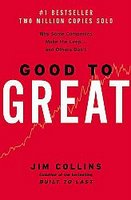Based on decades of scientific research on human motivation, Daniel Pink shows in this RSA Animate video the mismatch between what science knows and how business has it all wrong about what truly motivates us. He proves that while the old-fashioned carrot-and-stick approach works in some instances; it's precisely the wrong way to motivate when tasks are complex in nature or involve conceptual creative thinking. The three elements of true motivation are:
- Autonomy: the desire to direct our own lives
- Mastery: the urge to get better and better at something that matters
- Purpose: the yearning to do what we do in the service of something larger than ourselves









